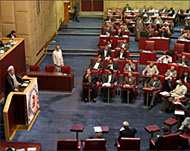Iran to curb foreign investors
Iran’s conservative-dominated parliament has approved the first reading of a bill that will place tough controls on foreign investment.

Embattled reformist President Muhammad Khatami said the move will deal a major blow to the economy.
“This law is without precedent in the history of the Islamic republic,” a visibly angry Khatami said after a cabinet meeting. “It will paralyse the work of the government.”
A majority of deputies gave preliminary approval to the bill, which obliges the government to seek the approval of MPs for major deals signed with foreign companies.
“This will discourage foreigners from investing in Iran. This will cost the country billions of dollars,” Khatami said.
“This law signifies that the voice of a government led by a president representing the people has no value and that the government cannot deal with the international community.”
Another blow
 |
|
Conservatives took control of the |
The vote is yet another setback for Khatami and his reformist-dominated cabinet, already politically isolated after the ouster of reformists from parliament in February’s elections.
Hardliners and conservatives took control of the Iranian parliament, or Majlis, after most reformists and moderates loyal to the government were barred from standing in the polls.
Parliament is now scheduled to examine the bill article by article, and Khatami said he hoped it would “change the nature of the text” in the process.
In its current form the bill is retroactive and would apply to any contracts signed from the beginning of the current Iranian year on 20 March, and in which a foreign company has more than a 49% stake.
Contracts
It also singles out contracts related to airport services and telecommunications.
This is a direct reference to an airport building and operating contract signed with Tepe-Akfen-Vie (TAV) – an Austrian-Turkish consortium – and a deal with Turkey’s Turkcell to provide Iran with more mobile phone lines.
In May Iran’s hardline Revolutionary Guards shut down Tehran’s new airport, arguing that the contract with TAV endangered the Islamic republic’s security because the operators also had business dealings with Israel.